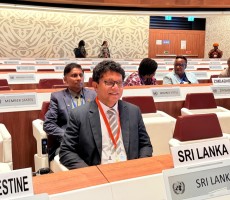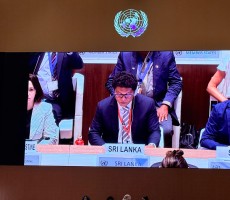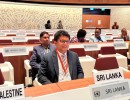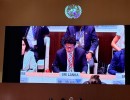Minister of Environment, Hon. Dr. Dammika Patabendi interacted at the Informal Ministerial Roundtable on 'challenges at national level to address plastic pollution' on 12 August 2025, held during the second part of the fifth session of the Intergovernmental Negotiating Committee on Plastic Pollution (INC 5.2) which is being held from 05-14 August 2025 in Geneva, Switzerland.


Distinguished Co-Chairs, Excellencies, Ladies and Gentlemen,
Sri Lanka extends its sincere appreciation to the Government of Switzerland for hosting this important meeting, and to the INC Secretariat for their tireless efforts and continued dedication towards the development of an international legally binding instrument on plastic pollution, including in the marine environment.
Sri Lanka is fully committed to addressing plastic pollution and has taken several proactive measures over the years. Among these, we have imposed restrictions on selected single-use plastic items, including plastic food containers, plates, cups, and cutlery. These measures reflect our national commitment to reduce the environmental footprint of plastic waste.
We are currently amended the National Environmental Act to further strengthen our regulatory framework. One of the key features of this amendment is the formal integration of Extended Producer Responsibility (EPR), which we believe is critical for ensuring sustainable production and consumption patterns.
Sri Lanka has also developed robust policy frameworks, including the National Policy on Waste Management and the National Policy on Chemical Management. These provide the foundation for a comprehensive approach to managing plastic and hazardous Chemicals across sectors.
A significant milestone was the launch of the National Action Plan on Plastic Waste Management 2021–2030, which sets out a clear and structured roadmap for tackling plastic waste based on 3R concept. In parallel, a nationwide awareness campaign on plastic pollution has been implemented with the support of international development partners, focusing on behavioral change and public engagement.
The engagement of informal waste collectors who form a critical link in the recycling chain continues to be one of Sri Lanka’s key strengths in advancing circularity in plastic management
Challenges at national level to address plastic pollution.
Even though, Sri Lanka has taken proactive measures over the year, we face several challenges that require international attention and collaboration.
First, we urge global standards to ensure that children’s products such as infant feeding bottles and slippy cups are free from hazardous chemicals, including phthalates and BPA. Transparency in the chemical content of plastic products is essential for both health and environmental protection.
Second, with regard to Article 7 on release and leakage, we strongly advocate for mandatory global packaging standards that prevent plastic leaching into marine ecosystems. The MV X-Press Pearl disaster, which released over 12,000 metric tons of plastic pellets into our coastal waters, remains a devastating example of the irreversible consequences of plastic leakage.
We also face technical, social, and economic barriers to implementation such as limited infrastructure for advanced recycling, lack of behavioral change at the community level, and financial constraints for innovation in biodegradable alternatives.
To overcome these, Sri Lanka calls for enhanced global cooperation to:
- Strengthen the science-policy interface;
- Support public awareness campaigns;
- Facilitate technical exchange programs, and policy development.
Plastic pollution is a global crisis. Let us act now together with urgency, clarity, and equity.
Excellencies, we believe that the legally binding instrument under negotiation must incorporate a comprehensive approach across the full lifecycle of plastics and provide enabling mechanisms for implementation, particularly for developing countries.
Sri Lanka stands ready to work constructively with all partners to achieve a global agreement that is ambitious, inclusive, and responsive to the needs of the most vulnerable.
Thank you.




